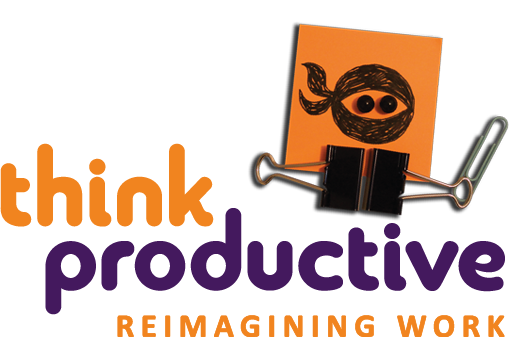For October’s productivity experiment, I asked for ideas from our social media followers and workshop delegates. We had lots of them. Some of them were very good, including a few that I am sure I will try at some point, but none of them felt quite right, given that our whole world has been turned upside down and back to front by chromosome disorders and pregnancy complications for the last few weeks. For the second month in a row, I needed to ignore the pre-planned script I set out for myself at the start of the year, and focus on finding a “truth” instead.
Thankfully, the baby is due in just a couple more weeks, which means we’ll actually know a bit more – like, facts! – as opposed to having to rely on the predictions and “expectation management” of the (brilliant) NHS doctors.
So I started thinking about what I need to give myself this month (inspired by erstwhile fellow Ninja Grace – here!). And I was thinking what I need to give Chaz too. And since Chaz works for Think Productive UK, what I also need to give her colleagues, who are also frantically and brilliantly dealing with the fact that she’s on maternity leave and that I’m about to join her on paternity leave from our small team (as well as them genuinely hoping everything is going to be fine for us, too).
And the only truth I could find was “Ruthless Kindness”.
On the surface this feels like it’s the opposite of productivity: perhaps you share the prevailing view that productivity is about pushing yourself harder, squeezing as much as possible from your time and attention and eliminating as much waste as you can, ignoring the losses of joy and pleasance and integrity that can happen alongside this. Perhaps you view work as something that you should fit into four hours a week before you spend the rest of your time in a hammock. Well, good luck. There are plenty of “gurus” out there for you and I’m certainly not one of them.
Because I think work and therefore productivity (aka simply “the success of your work”?) needs to have meaning and purpose too, otherwise it’s just soulless and uninspiring. And whilst this meaning might link to a set of life values such as contribution or justice, and whilst through your work you might find self-actualisation and a sense of societal contribution, these certainly aren’t the only meanings I’m talking about. Communities form around work with good reason.
Community is important in our work. We need to feel a sense of a shared direction or endeavour, and part of a diverse and interesting bigger picture. And without this, perhaps work loses that meaning. And when work loses its meaning it becomes less worthy of our motivation which in turn makes us unproductive. And so my friends, kindness is actually part of the productivity machine… as well as being a nice thing to have in the world, too.
What’s my hypothesis?
So this month starts with the notion that kindness has an important role to play in our productivity. There are a few specifics here that I want to explore:
1. It’s important to be kind to yourself
I have said before that over the years, I haven’t always been able to be kind to myself or put myself first. I have a tendency to very strongly veer towards making sure I don’t let anyone down. And by the way, running a company and releasing books about productivity is a fantastic way of creating the necessary anxiety and accountability to want to “walk the talk”!
I’m sure like me, you’re sometimes guilty of biting off more than you can chew because to tell your boss you’re a hero with magical powers sounds oh so much better than to instead reveal yourself honestly as a flawed human being with limited capacities. It’s better for our boss’s confidence in us and it’s better for our confidence in ourselves too.
But saying yes to too many things means we’re often left saying no to ourselves. We miss out on abundance, we miss out experiences and we miss out on “life”. There is meaning and purpose outside of work, too. I hope that’s not a shock to you. If it is, please go and stare at the sea for a whole day. Take nothing with you. No, especially not your phone.
Ruthless Kindness is, in this personal definition, the same as what I called in my book “preparedness”: a Ninja in constant battle will lose in the end. Sleep, diet and relaxation play their part, as too does keeping good organisational systems so you can stay clear and limit uncertainty only to the things you actually enjoy being uncertain or spontaneous about.
This month, I hope to practice “Ruthless Kindness” for myself, railing against my own internal guilt-trip mechanisms.
2. It’s important to foster a culture of kindness in organisations to get work done
But what if we take Ruthless Kindness one step further? It’s not how you treat yourself here, but how you show kindness for others. If you’re a manager, chances are this isn’t top of your to-do list right now, but when I think back to bosses I’ve had over the years, most of the memorable moments came from acts of generosity and sacrifice.
Creating supportive cultures surely eliminates personal stress and surely makes work (and productivity) easier, right?
Corporations sometimes try to institutionalise kindness. In fact, Think Productive UK has been invited to be the acceptable face of several corporate wellbeing days over the years – sorting out your inbox interspersed somewhere between the yoga and the smoothies – but I’ve always left such events wondering what happens the very next day when the focus is back on the work; and whether the genuine sincerity and compassion that comes from a manager initiating such a day just ends up scaling into tokenism and quick-fixes and cycle scheme tax breaks.
Come to think of it, I don’t know that Think Productive UK’s own culture is particularly “kind”. I think our culture is pragmatic and human, we value integrity, we listen and we genuinely care. But kind? Proactively? When things are good as well as when things are bad? Not so sure.
So let’s see if I can instigate some ruthless kindness in the Think Productive UK ranks this month.
3. Being ruthlessly kind to yourself and to others is a strength not a weakness
This goes against most of our common cultural assumptions, I know.
It’s funny how our culture is so driven by such an abstract notion as “success”. What does success mean for you? What does it really mean? Beyond the next consumer durable purchase and beyond the notion of “security” or “happiness”? It seems like the “success” narrative is the ultimate MacGuffin.
And as a result we chase it, thinking the only way to behave in organisations and in society is to act like Gordon Gecko, get ahead of everyone else and find the end of the rainbow. Instead, perhaps we should worry about how to share our umbrella.
We view the people who choose the giving or receiving of kindness over the ruthless chasing of “success” as somehow wrong (perhaps we secretly envy the fact that they suffer less than we do!) yet perhaps choosing kindness is a sign of strength not weakness – a sign of being comfortable in one’s own skin.
Hope and fears?
Well, I both hope and fear that you feel uncomfortable or frustrated reading this. It’s meant to provoke a little debate and conversation about how we work, collaborate and relate. I fear that it might be ‘too fluffy’ for lots of people (especially lots of Think Productive UK’s clients). If that’s you, then read this again through the lens of kindness not cynicism, and then kindly share your thoughts with me. No stress!
I also have a fear that this is so abstract that I won’t be able to think of enough things! So if you have ideas that may help, please kindly share them.
As my hero John Martyn once sang, “Life, go easy on me”…



Hi Graham,
I came across your blog when I searched “does kindness to yourself instigate kindness to others”. This week I am managing a difficult staff member. She is successful and controlling; unable to delegate. This got me thinking after what I call a failed conversation between us, on the impacts this was having on my staff member and her team. Thank you for taking the time to craft and tell the story of kindness in the context of productivity, I think you have a valid point of view and you’ve given me some more angles to approach my thinking on this challenge.
Many thanks,
Trang